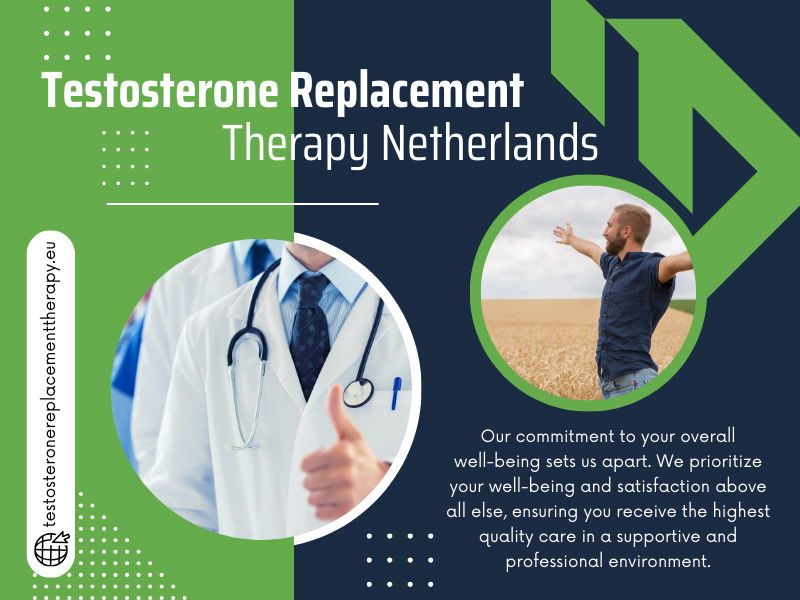Testosterone Replacement Therapy Netherlands
Comprehensive Insights into Testosterone Replacement Therapy: Facts and Myths
Before you opt for Testosterone Replacement Therapy Netherlands, it's important to distinguish facts from myths surrounding this treatment.
Testosterone Replacement Therapy (TRT) is a well-established medical intervention for individuals with clinically low testosterone levels, known as hypogonadism.
However, misinformation and misconceptions about TRT abound. In this blog, we'll delve into comprehensive insights about TRT, addressing common facts and dispelling prevalent myths.
Understanding Testosterone Replacement Therapy
Testosterone is a crucial hormone responsible for various bodily functions, including the development of male reproductive tissues, muscle mass maintenance, bone density regulation, and mood stability.
When testosterone levels decline significantly, individuals may experience symptoms such as decreased libido, fatigue, muscle loss, and mood changes.
TRT Netherlands treatment aims to restore testosterone levels to a normal range, alleviating these symptoms and improving overall well-being.
Facts about Testosterone Replacement Therapy
Like any medical intervention, testosterone replacement therapy (TRT) comes with both benefits and considerations. It's essential to understand the following facts about TRT to make informed decisions about your health:
Medical Supervision:
TRT should always be prescribed and monitored by qualified healthcare professionals, typically endocrinologists or urologists. They conduct thorough evaluations, including blood tests and symptom assessments, to diagnose low testosterone levels accurately before initiating treatment.
Personalized Treatment Plans:
TRT is not a one-size-fits-all approach. Each individual's treatment plan is tailored based on their specific hormone levels, symptoms, medical history, and lifestyle factors. The personalized approach assures optimal results and minimizes potential risks.
Administration Methods:
TRT can be administered through various methods, including injections, topical gels or patches, implants, or oral tablets. Administration choice depends on individual preferences, convenience, and healthcare provider recommendations.
Benefits of TRT:
When used appropriately, TRT can offer significant benefits such as improved libido and sexual function, increased muscle mass and strength, enhanced mood and cognitive function, boosted energy levels, and better bone density. These benefits contribute to an overall improvement in quality of life for individuals with low testosterone levels.
Myths Surrounding Testosterone Replacement Therapy
Some of the myths surrounding TRT therapy include:
Myth: TRT Causes Aggressive Behavior:
There is no scientific evidence linking TRT to increased aggression or anger. TRT has been shown to improve mood stability and reduce irritability in individuals with low testosterone.
Myth: TRT Causes Prostate Cancer:
There is no conclusive evidence linking TRT to an increased risk of developing prostate cancer; however, individuals with a history of prostate cancer should undergo thorough evaluation and monitoring before considering TRT.
Myth: TRT is Only for Older Men:
While testosterone levels naturally decline with age, low testosterone can occur at any age due to various medical conditions or lifestyle factors. TRT is suitable for individuals of different age groups who meet the criteria for treatment.
Myth: TRT Is Risky and Unsafe:
When prescribed and monitored by qualified healthcare professionals, TRT is generally safe and well-tolerated. Potential risks such as polycythemia (increased red blood cell count) and skin reactions are closely monitored and managed.
Conclusion
Testosterone Replacement Therapy is a valuable treatment option for individuals with clinically diagnosed low testosterone levels, offering various benefits when administered under proper medical supervision.
By understanding the facts and dispelling common myths surrounding TRT, individuals can make informed decisions about their health and well-being.
If you suspect you have low testosterone or are considering TRT, consult with our qualified healthcare provider at Androgenix to discuss personalized treatment options and address any concerns.

